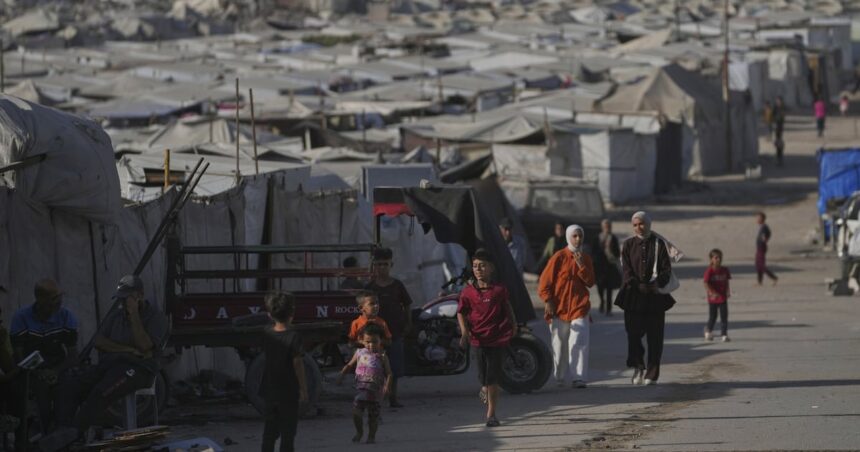I stepped out of a United Nations helicopter onto the landing pad in East Jerusalem last Tuesday, struck by the surreal disconnect between the relative calm here and the devastation just 50 miles away in Gaza. Over coffee with a UN official – their voice lowered despite our private setting – I learned of a troubling new development in Israel’s increasingly confrontational stance toward international organizations.
“They’re simply not renewing the visas,” the official told me, requesting anonymity due to the sensitivity of ongoing negotiations. “It’s a bureaucratic weapon that effectively removes key personnel without the political fallout of direct expulsions.”
Israel has refused to renew visas for the heads of at least three United Nations agencies operating in Gaza, creating a leadership vacuum in humanitarian operations at a critical moment when more than 2 million Palestinians face acute food insecurity and displacement.
The affected agencies include some of the most crucial humanitarian operations in the territory. Though the Israeli government has not issued formal statements about these specific visa denials, the pattern suggests a coordinated approach to restrict specific UN leaders from continuing their work.
Philippe Lazzarini, Commissioner-General of UNRWA (United Nations Relief and Works Agency), confirmed his visa situation remains unresolved after months of uncertainty. “The humanitarian imperative must transcend politics,” Lazzarini told me via secure call from Amman. “Our operations depend on consistent leadership and institutional memory, both of which are compromised by these administrative barriers.”
This visa crisis unfolds against a backdrop of deteriorating relations between Israel and UN bodies. Prime Minister Benjamin Netanyahu’s government has repeatedly accused UNRWA of harboring Hamas sympathizers among its staff – allegations that gained momentum after Israel claimed several UNRWA employees participated in the October 7 attacks.
An independent review led by former French Foreign Minister Catherine Colonna examined these claims, finding significant gaps in UNRWA’s neutrality mechanisms but noting that Israel had not provided evidence supporting many of its most serious allegations against the agency’s staff.
Walking through East Jerusalem’s narrow streets the following morning, I met Samir, a Palestinian businessman whose family maintains connections throughout Gaza. “They’re squeezing from all sides,” he explained as we navigated around Israeli security checkpoints. “First bombing the aid warehouses, then restricting border crossings, now removing the people who coordinate what little assistance makes it through.”
The Israeli government’s official position, articulated by Foreign Ministry spokesperson Oren Marmorstein during a press briefing I attended, frames these visa decisions as sovereign immigration matters rather than humanitarian obstruction. “Israel maintains the right to determine who operates within areas under its security control,” Marmorstein stated. “This is standard practice for any nation facing security threats.”
Yet UN officials and humanitarian experts view these visa denials as part of a broader pattern of obstruction. Dr. Maha Sabri, a Palestinian-American aid coordination specialist formerly with Médecins Sans Frontières, explained the cascading effects: “When you remove agency leadership, you disrupt supply chains, funding pipelines, and institutional relationships built over years. These aren’t easily replaced, especially in active conflict zones.”
The International Crisis Group released data last month showing that humanitarian access to Gaza has reached its lowest point since the conflict began. Only 17% of planned aid convoys reached their destinations in northern Gaza during May, compared to 43% in January.
Israel’s Foreign Ministry disputes these figures, citing Hamas diversion of aid as the primary obstacle. However, my review of UN logistics reports indicates that Israeli administrative delays and denial of access were cited in 72% of failed delivery attempts.
The visa restrictions extend beyond UNRWA. Leaders from the World Food Programme and UNICEF have also reportedly faced similar barriers, though these agencies have been more reluctant to speak publicly about their challenges, fearing further restrictions.
During a closed-door session at the Jerusalem Press Club that I attended under Chatham House rules, a senior Israeli security official framed the visa issues as legitimate responses to what he characterized as “UN complicity” in Hamas operations. “When international staff use their positions to facilitate terrorism, directly or indirectly, we cannot be expected to welcome their continued presence,” he stated.
But Martin Griffiths, UN Under-Secretary-General for Humanitarian Affairs, rejected this framing during our conversation in his temporary office in Amman. “These blanket approaches punish entire populations dependent on humanitarian assistance,” Griffiths said. “Any legitimate security concerns should be addressed through established protocols, not by dismantling humanitarian leadership.”
The European Union’s humanitarian commissioner Janez Lenarčič called the visa restrictions “deeply troubling” during a donor conference I covered in Brussels last week. “Humanitarian operations require consistency and predictability,” Lenarčič emphasized. “Administrative obstacles that remove experienced leadership directly impact life-saving operations.”
For Palestinians in Gaza, these diplomatic tensions translate into concrete suffering. Through secure messaging apps, I’ve maintained contact with Rami, a former university professor now sheltering with his family in Deir al-Balah. “The coordination problems are visible on the ground,” he wrote. “Aid arrives sporadically, if at all. Nobody seems to know when or where distributions will happen. People wait for days at collection points.”
The visa restrictions represent just one facet of increasingly strained relations between Israel and international organizations. Last month, Israel’s parliament advanced legislation to end UNRWA operations in territories under Israeli control, including East Jerusalem.
As I prepare to leave Jerusalem for my next assignment in Beirut, the consequences of these diplomatic maneuvers remain painfully clear. Whatever legitimate security concerns Israel may have regarding specific UN personnel, the collective punishment of Gaza’s civilian population through humanitarian obstruction raises serious questions under international humanitarian law.
The bureaucratic weapon of visa denials may seem bloodless compared to military operations, but for populations dependent on coordinated international assistance, the effects can be equally devastating.






